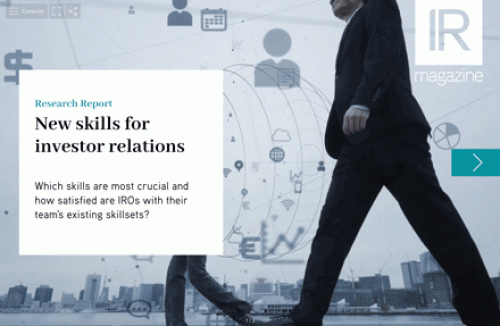Investor relations professionals are increasingly combining IR with other responsibilities, according to recruitment consultants.
Many IR leaders today manage additional areas such as strategy, corporate development, corporate affairs and financial planning, while IR teams are also taking ownership of sustainability and ESG programs.
The trend speaks to the growth in experience and stature of the individuals running IR departments, says Oskar Yasar, managing partner at Broome Yasar Partnership.
‘People coming into IR are much more sophisticated [now] than they have ever been,’ he says. ‘Gone are the days when IR was deemed to be a back office function. Into IR has come a plethora of people who not only have financial qualifications, like chartered accountants and chartered financial analysts, but in some cases also hold MBAs and PhDs. These people have different levels of ambition and confidence.’
Yasar says when he asks directors of IR where they see themselves in five years’ time, they are often ‘quite bamboozled because they don’t know which route to take – and this is possibly due to the many options they have.’ He encourages IROs to go to senior management and ask for additional roles. ‘CFOs don’t want to lose good talent,’ he explains.
The IR role has expanded over recent years to include responsibility for or involvement in many different areas, says Debbie Nathan, head of the IR and communications practice at Carter Murray.
The most successful IROs are valued for the input they can provide across areas like strategy, external communications and sustainability, she says. This not only helps companies better align their departments internally, but also allows ambitious IR professionals to add new strings to their bow.
Nathan points out that, where an individual has responsibility for multiple departments, they may only be overseeing IR and not be involved in the day-to-day activities. ‘What tends to happen is they’d have a head of IR and then a deputy,’ she explains. ‘The number two at a very large cap would be the equivalent of a head of IR at a FTSE 250 company.’
Smaller, domestically focused companies may also have IR team leaders with hybrid job titles, notes Nathan. In these companies, IR may not take up five days a week, so it is combined with other duties, she says.
While job titles are not a particularly reliable way to understand an individual’s responsibilities, they still provide insight into the types of positions being combined with IR in senior roles.
Around one in five IR department heads in the FTSE 100 have a hybrid job title, according to an analysis by IR Magazine. The most popular area to combine with IR is corporate communications, followed by strategy or strategic planning. There are also several individuals whose title includes IR plus a finance position, such as corporate finance, financial performance or financial controller.
Yasar says IROs away from the very largest companies have a better chance of expanding their responsibilities. ‘The larger the market capitalization of the company, the bigger the IR program – so individuals don’t have the time in their calendars to do IR and something else,’ he explains. ‘In the FTSE 250, there are more examples of IROs who have a foot in another camp [than there are in] the FTSE 100.’
Diverse duties
The duties being combined with investor relations differ greatly – a reflection of both the varied background of IR professionals and the unique way the function is treated at each company.
‘A lot of my IR clients now have the title of director of IR and strategy or even, in many cases, IR and corporate affairs, where there is obviously significant alignment,’ says Yasar. ‘They are now also covering corporate development, so doing M&A and all sorts of corporate development issues. A lot of them are moving into financial planning and analysis, too.’
The growing investor focus on ESG issues is further influencing IR remits. In recent years, ESG funds have experienced huge inflows – a trend that has held up despite the market downturn caused by the Covid-19 pandemic.
‘Directors of IR are definitely taking over sustainability and ESG matters because it’s a significant part of what they do now,’ says Yasar. ‘You have some directors of IR and sustainability. Some second-tier IROs, perhaps heads of IR who report into a director of IR, have changed their job title to IR and ESG. What companies want with that is to show the market they are taking ESG incredibly seriously.’
Nathan says some CEOs, when recruiting an IRO, are asking for someone who can come in and shape the sustainability agenda. This may be because the company has a high level of ownership by sustainable funds or wants to present itself as a front runner on ESG issues. ‘They would want someone with a passion and interest in driving this forward,’ she says.
Writing in the summer issue of IR Magazine, Katrina Rymill, vice president of IR and sustainability at Equinix, argues that the growing interest in sustainability offers a career opportunity for IROs.
She became her company’s executive sponsor for the sustainability program early last year. The plan was for the role to take up 5 percent of her time, but over the last year and a half that has grown to 40 percent.
‘Sustainability is exposing new opportunities for IROs to have greater influence on the direction, strategy and impact of their companies, as well as enhancing IROs’ career paths while potentially having substantial positive impact on their communities,’ she writes.










